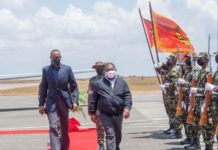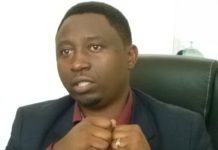1. Background
The Democratic Forces for the Liberation of Rwanda (FDLR) is political organisation, born out of the will of Rwandan refugees, male and female of all ages, who were abandoned to themselves by international community. The FDLR is determined to defend them and to liberate their motherland from a totalitarian and racist regime, which terrorises and threatens its own people inside and outside Rwanda.
The FDLR was created in 2000 as a response to the Rwanda Patriotic Front (RPF)’s scorns and arrogance as well its merciless and bloody repressions and fascism. These methods are preferred by the RPF over a political dialogue and peace process requested by the FDLR. The FDLR believes that peace initiatives will advance and promote the respect and observance of fundamental human
rights and the dignity of Rwandans.
The FDLR is a liberation movement, which is also a protector and mouthpiece of the oppressed and marginalised ones. It is a hope of a new era and a new dawn of peace, reconciliation, participatory democracy and freedom of Rwandan people.
The FDLR is the voice of “voiceless” people, including:
- Oppressed, marginalised, and terrorised Rwandans
- Thousands of arbitrarily arrested and/or imprisoned Rwandans
- Thousands of victims of the Rwandan tragedy (Rwandan nationals or foreigners) who are deprived of their rights to seek redress
Whereas the Rwandan regime is characterised by persistent assassinations, arbitrary arrests, illegal imprisonments, armed robberies, embezzlement of public funds, corruption, pauperisation of Rwandan peoples, injustice, promotion of Rwandan inter-ethnic conflict by means of exclusion and collective blame;
Whereas Rwandan refugee problem is aggravated by recurring military attacks against these very refugees, based in the Democratic Republic of the Congo (DRC) and by unending hunting down of Rwandan refugees who sought asylum in other countries by the RPF regime;
Whereas the RPF government had established a political system which is discriminatory, scornful, arrogant and which is implementing an “apartheid system” or exclusionary socio-economic development policies;
Whereas the RPF uses the protection of the Tutsi minority to invade the DRC (a country which had historically been a very good neighbour to Rwanda) and to cause deaths of millions of Congolese people and suffering to millions of others;
Whereas the Rwandan genocide and subsequent oppression of Rwandans continue to have the negative impact on well-beings of all Rwandans and on peace, security, and stability in Rwanda in particular and in Great Lakes region in general;
We, Rwandan refugees:
- Finally decide not to sit back and relax while we are faced by a politically distressing situation that needs a radical change;
- Are actually ready for the supreme sacrifice in view to liberate Rwandan people who had been subjected to slavery, oppression, degradation, humiliation, demonization, and other human rights violations, as from July 1994 up to date, by a handful of professional murderers, crooks, and shameless liars, who are masterminds of the Rwandan genocide and massive human rights violation;
- Stress the need to save the Rwandan people before it is too late, from the “pit” in which they have been thrown by the RPF regime.
2. Objectives of the FDLR.
The main objectives are as follows:
- To work towards the return of long lasting peace in Rwanda and in the Great Lakes Region.
- To work towards establishment of governance based on the universal principles of rule of law and democracy.
- To work towards the promotion of moral values, namely the respect of human life and human dignity; honesty; truth; freedom; justice; the emancipation of the individual human being; respect of one’s neighbour; tolerance; pacific cohabitation; mutual trust; mutual empathy and the inter-dependence of Rwandans.
- To work towards a genuine social and national reconciliation
- To work towards establishment of the truth with regard to the Rwandan tragic drama (1990 up to date) in order to identify all the culprits and bring them to book and eventually rehabilitate all the victims thereof without any prejudice.
- To establish a real effective checks and balances system as to properly manage the Rwandan “public patrimony” (“Res publica”).
- To suggest a national amnesty as to nurture and sustain a real and genuine social reconciliation and national unity of Rwandan peoples, united within their respective ethnic social groups as Hutus, Tutsis and Twas, as well as fostering individual and social psychological healing from trauma resulting from the 1990-1994 massive violence and its aftermath.
3. Destabilisation of the DRC by Rwanda
Besides what had been reported herein above, the FDLR is equally concerned by ongoing destabilisation of the eastern DRC by Rwanda and the uncertainties of Rwandan Hutu refugees concerning their future. Rwandan Hutu refugees had been victims of regular attacks, launched by President Paul KAGAME’s troops as from 1994 up to date. In addition, these refugees were abandoned to their own fate by the international community since 1996 up to date.
In light of the above, the FDLR is convinced that issues of insecurity and destabilisation of the Great Lakes Region is profoundly caused by Rwanda, a country which has been hold captive by President Kagame and his handful junta. The RPF Government has been using the presence of his opponents in DRC (among which are Hutus refugees who had simply refused to be subjected
to its tyrannical governance) as pretext for his regular invasions. Actually, these invasions have been motivated by its hegemonic and self-centred ambitions to loot the rich minerals of DRC
The FDLR has always demonstrated its willingness and readiness to take the route of peace process endeavours, but, every single effort is nullified by the RPF regime – which had been preferring military action rather than peace
dialogue. As a matter of fact, the RPF regime does not show any interest in considering the FDLR concerns and thus conciliatorily address and resolve them once and for all. On contrary, the FDLR’s presence in DRC is used as a good reason and an excuse for the RPF government to comfortably pursue and realise its Machiavellian dreams. That is the reason why the RPF regime would
use all means and ways to fabricate criminal acts and ultimately place these culpabilities upon FDLR’s shoulder. The RPF have falsely implicated or accused FDLR for committing multiple crimes in Rwanda and DRC despite the fact that these crimes were committed by the RPF troops under RPF’s proxy wars, designed and calculated to loot and pillage the DRC’s natural resources.
The FDLR call on the international community to show more firmness towards RPF regime, which, for two decades, victimised Rwandans politically, economically, militarily and psychologically. Regardless this fact, the international community had been showing sympathy, attention, and compassion for the RPF regime. As a result, the international community has been babysitting the RPF and turned a blind eye to its massive violence and crimes similar to those of the apartheid regime in SA. The FDLR put it to the international community that it is the only one that has investigated and affirmed the RPF culpabilities in various United Nations reports. The RPF is nothing else but a callous pyromaniac organization.
The FDLR urges the Rwandan government to engage in a highly inclusive Rwandan dialogue, similar to the one that took place in the neighbouring Burundi, Uganda, DRC and in South Africa in order to sort out the Rwandan political problem which is the genesis and major factor of the endless insecurity and instability within the eastern DRC. The restoration of peace and stability in the eastern DRC must absolutely come through political dialogue and peace process.
4. Fate of Rwandan Hutu refugees in the Eastern DRC
The fate of Rwandan Hutu refugees who were abandoned to themselves by the international community since 1996 up to date should be an issue of concern to every human being whose compassion and determination are to save humanity from the scourge of war and sufferings. The Rwandan refugees were shadily abandoned to themselves, without any substantial humanitarian assistance, be it material or moral, and without any international protection from a receiving country, or any other country, or the UN institutions or any humanitarian NGOs (Non-Governmental Organisations). Amazingly, they were also abandoned by
the United Nations High Commission for Refugees (UNHCR) to suffer from starvation and psychological distress and socio-economic shocks.
The FDLR pleads with the international community, more particularly with the United Nations (UN), Africa Union (AU), European Union (EU), Southern Africa Development Community (SADC), International Conference on the Great Lakes Region (ICGLR) to take into consideration the Rwandan refugees misery and sufferings and to support political dialogue which will lead to a viable and durable solution to Rwandan refugee problem.
The above-mentioned organisations should take resolutions which take into account the legitimate and protracted refugee problem. They should speedily and collectively act towards protecting them and humanitarianly assisting them rather than compelling them to repatriate against their will. The political conditions prevailing in Rwanda are not so conducive to such an extent that a voluntary repatriation can be an option. The Rwandan government is an authoritarian regime which is against any initiative towards:
Granting free, fair and equal political rights to its citizens;
- Establishment of the rule of law;
- Allowing equal democratic rights to all political parties;
- Dispensing fair justice to all Rwandans; and
- Formulating one national army whose mission will be to defend the Rwandan nation and its territorial integrity rather than being a quasi-private army, which protects the personal egocentric interests of the Rwandan junta.
5. FDLR vision related to political dialogue
The path to viable and long-lasting solution to the Rwandan conflict should take root in a deep analysis and evaluation of the historical causes of it on the one hand, and a revalidation and a reassessment of the 1994 Rwandan tragic events on the other. Historically, ethnic conflict and distortion of the truth related to the 1994 genocide in the favour of the RPF are the main causes of the protracted armed conflict and political violence. For the achievement of a durable solution, the FDLR, on the 30th December 2013, suggested the Peace Process Proposal (PPP), of which it is implementing. Unilaterally, it began implementing it in a
way of abandoning military actions. In so doing, it laid down its weapons in North-Kivu and South-Kivu on 30 May 2014 and on 09 June 2014, respectively.
The FDLR’s peace initiative is worthy supporting by all necessary means.
Following from and in further pursuance of the above peace initiative, the FDLR also reckons that:
- The Rwandan conflict is a multifaceted political conflict. Accordingly, the solution thereof must be a political solution. A political solution can be neither valid nor effective until it is fair, just, and balances the legitimate interests of all involved or concerned parties of the Rwandan society, namely Tutsis, Hutus and Twas.
- Every single and sincere attempt to initiate peace process intended to reach negotiations taken by one party on conflict or every single attempt taken by a third party or third parties to mediate between the RPF government and FDLR (Rwandan political opposition) must be supported.
- The respect of universally recognised freedoms and human rights and the principles laid down in the Charter of the United Nations and the Charter of the Organisation of African Unity (now African Union) and other human rights conventions remain sacred and shall be observed and safeguarded.
- It is thus a necessity for every Rwandan citizen in general and leaders in particular, to realise the importance of resolving the Rwandan conflict through restorative rather than retributive justice. The former will involve perpetrators, victims and members of the community to come to terms with the past.
- Restorative justice should focus on truth-telling, apologies, and forgiveness, including, where necessary, the granting of amnesty as this approach would lead to a genuine national reconciliation and restitution among three Rwandan ethnics, namely Hutus, Tutsis and Twas. A genuine reconciliation, involving all Rwandan ethnics as victims, perpetrators and survivors, will pave the way to reconciled Rwandans and a quick recovering process of psychological healing.
- Rwanda is a tri-nation comprises of Hutu, Tutsi and Twa, who should live together in harmony in their motherland, and who should on equal footing, participate in the Rwandan affairs. There will be no future without political dialogue and without forgiveness. Changing of conflicting parties’ mindset is crucial if we want to move Rwanda forward and to safeguard it from total destruction.
Done at Walikale on 06/December/2014
On behalf of and in the name of FDLR:
Byiringiro Victor
Général Major
Président ai des FDLR































































